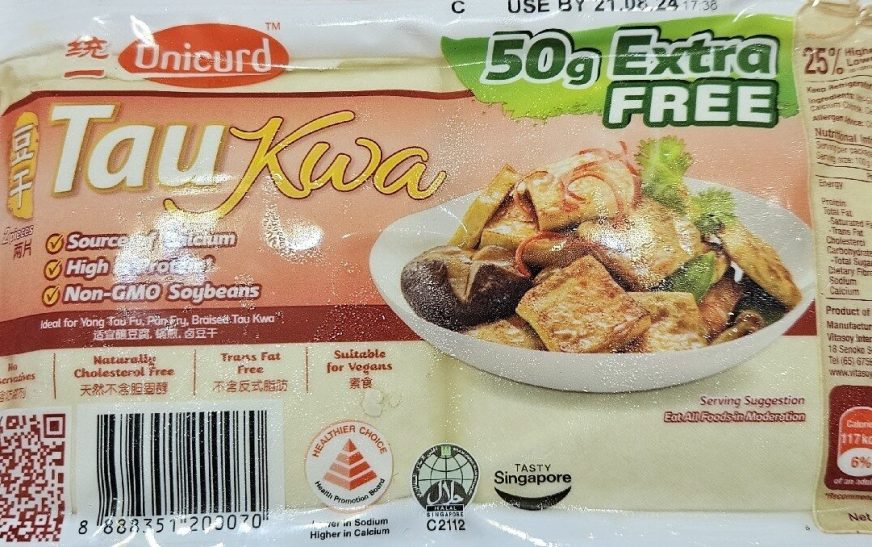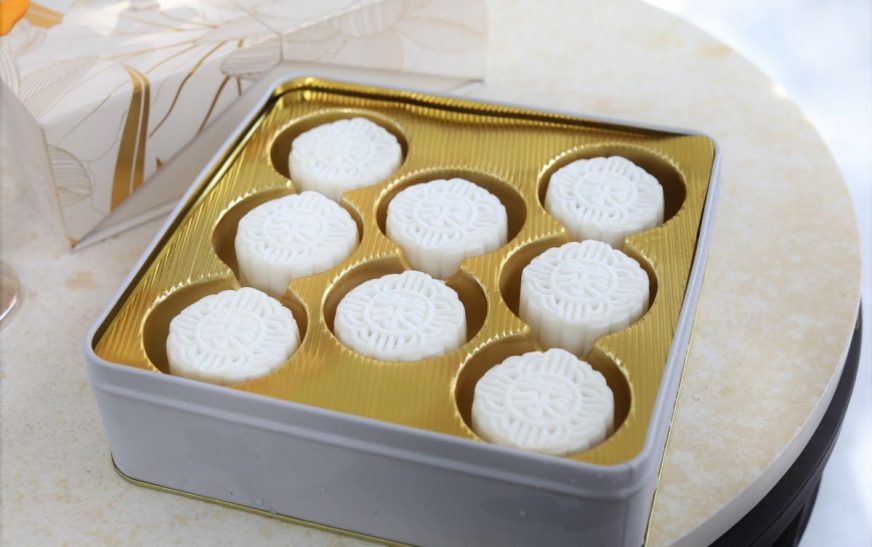Tau kwa, a firm tofu variety, is a popular ingredient in Asian cuisine, known for its rich texture and high protein content. But if you’re watching your calorie intake, you might wonder—is tau kwa a healthy choice or a diet buster?
In this article, we’ll break down the calories in tau kwa, its nutritional benefits, and whether it fits into a balanced diet. If you’re a fitness enthusiast, vegetarian, or just love tofu, keep reading to learn how tau kwa can support your health goals!
How Many Calories Are in Tau Kwa?
Calorie Count of Tau Kwa
Tau kwa is denser and firmer than regular tofu, making it a more protein-rich option. Here’s the caloric breakdown per 100g of tau kwa:
| Nutrient | Amount per 100g |
| Calories | ~120 kcal |
| Protein | 10–12g |
| Fat | 6–8g |
| Carbohydrates | 2–3g |
| Fiber | 1g |
Compared to soft tofu (which contains around 70–80 kcal per 100g), tau kwa is slightly higher in calories due to its lower water content. However, its high protein and moderate fat content make it an excellent source of plant-based nutrition.
Calories in Different Cooking Methods
The way you prepare tau kwa significantly impacts its calorie count:
- Raw tau kwa (per 100g): ~120 kcal
- Pan-fried tau kwa (with oil): ~180–200 kcal
- Deep-fried tau kwa: ~250–300 kcal
- Steamed tau kwa: ~120 kcal (same as raw)
- Braised tau kwa: ~140–160 kcal (depending on sauce)
If you’re aiming for a low-calorie meal, steaming or grilling tau kwa is the best option, while deep-frying adds extra calories due to oil absorption.
Health Benefits of Tau Kwa
High in Protein for Muscle Growth & Repair
Tau kwa contains 10–12g of protein per 100g, making it an excellent alternative to meat. This helps with muscle building, tissue repair, and overall strength, especially for vegetarians and vegans.
Heart-Friendly with Healthy Fats
Unlike meat-based protein sources, tau kwa contains unsaturated fats, which support heart health. It has zero cholesterol, making it a great option for those managing cholesterol levels.
Rich in Essential Nutrients
Tau kwa is a good source of:


A Weight-Loss Friendly Food
Due to its high protein and low-carb content, tau kwa can keep you full for longer, reducing unnecessary snacking. If you’re on a weight loss diet, opt for steamed or stir-fried tau kwa with minimal oil.
Supports Digestive Health
Being plant-based, tau kwa contains fiber and phytonutrients that promote gut health and digestion. However, it’s lower in fiber compared to whole soybeans, so pair it with fiber-rich vegetables.
Is Tau Kwa Good for Your Diet?
Tau Kwa for Weight Loss
Yes, if you eat it in moderation and avoid deep-frying.
No, if you consume too much fried tau kwa with high-calorie sauces.
Tau Kwa for Muscle Gain


Tau Kwa for Low-Carb & Keto Diets

Best Ways to Eat Tau Kwa
Stir-Fried Tau Kwa with Vegetables
A simple, healthy dish where tau kwa is stir-fried with garlic, soy sauce, and colorful veggies like bell peppers and broccoli.
Tau Kwa Salad with Sesame Dressing
Pair cubed tau kwa with fresh greens, cherry tomatoes, and a light sesame dressing for a high-protein salad.
Braised Tau Kwa in Soy Sauce
A classic Asian-style dish where tau kwa is simmered in a savory soy-based sauce with mushrooms and bok choy.
Grilled Tau Kwa Skewers
Marinate tau kwa in a spicy or tangy sauce and grill for a low-fat, high-protein snack.
Tau Kwa Scramble (Egg-Free Option)
Mash tau kwa and sauté it with turmeric, black salt, and onions for a plant-based “scrambled egg” alternative.
Conclusion
So, is tau kwa good for your diet? Absolutely! With just 120 kcal per 100g, high protein, and essential nutrients, tau kwa is a fantastic plant-based food. Whether you’re losing weight, building muscle, or just eating healthy, tau kwa can be a great addition to your meals.
Just remember—how you cook it matters! Avoid deep-frying and opt for healthier cooking methods like steaming, stir-frying, or grilling.
FAQs
Is tau kwa healthier than regular tofu?
Tau kwa is higher in protein and calories than soft tofu due to its firmness. If you need more protein, tau kwa is a great choice!
Can I eat tau kwa every day?
Yes, in moderation! It’s a nutritious plant-based protein, but balance it with other protein sources and vegetables.
Does tau kwa have more calories than chicken?
Tau kwa has fewer calories than fried chicken but more than lean chicken breast. However, it has the advantage of being cholesterol-free and plant-based.
Is tau kwa okay for diabetics?
Yes! Tau kwa is low in carbohydrates, making it a diabetes-friendly protein source.
What’s the lowest-calorie way to cook tau kwa?
Steaming, grilling, or air-frying tau kwa without oil keeps the calories lowest while preserving its nutritional benefits.
Also read: Hilton Status Challenge for Sale: Navigating the Risks and Realities










